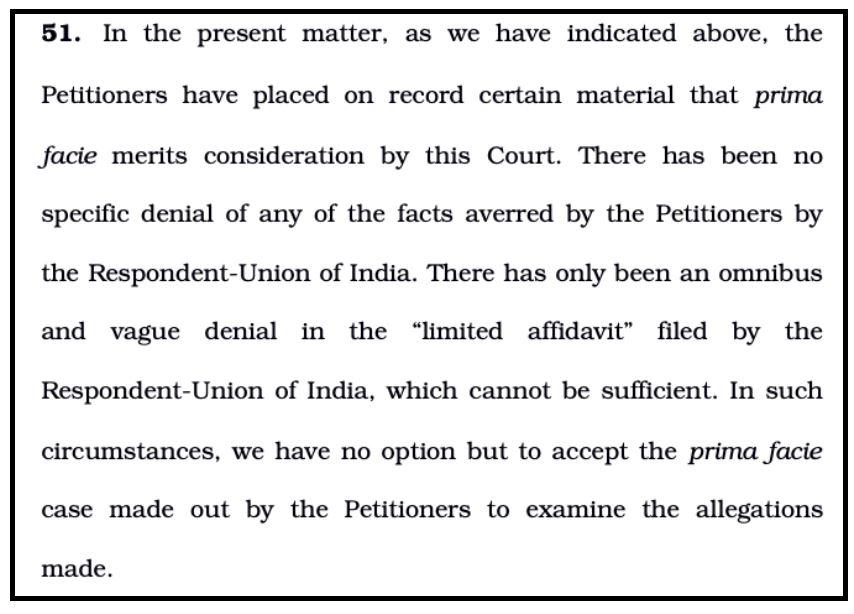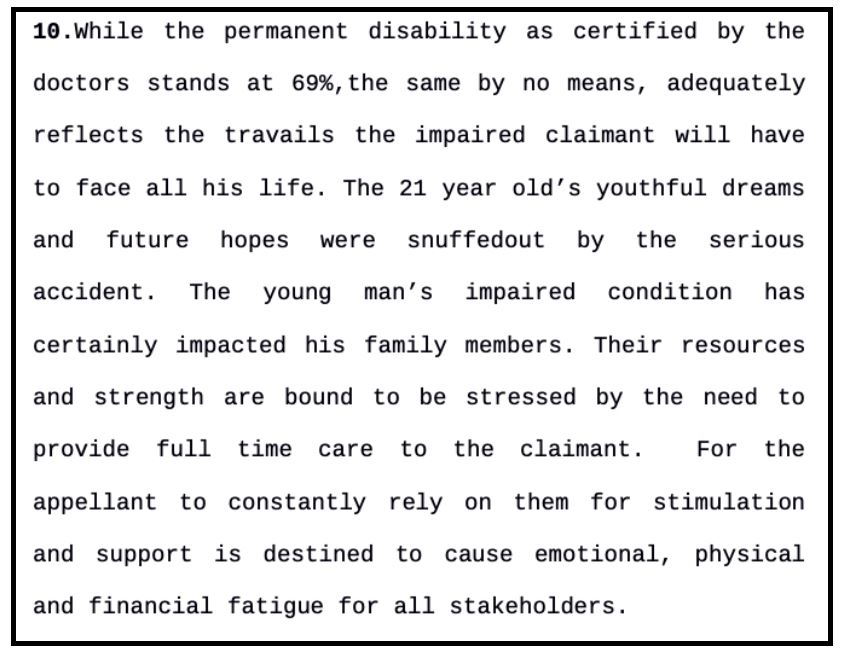In this roundup of court judgements, we look at Constitutional Courts’ remarks & directions about atrocities against SC/STs, probe on Pegasus snooping allegations, insurance compensation for loss of earning capacity, and distance between a bar and temple.
Supreme Court: Notice to the victim under Section 15A in court proceedings against accused is mandatory; atrocities against SC/STs are not a thing of the past.
In the case Hariram Bhambhi vs. Satyanarayan, the Supreme Court held that reasonable and timely notice must be issued to the victim or their dependent, as per the requirement of Section 15A of the Schedule Castes and Schedule Tribes (Prevention of Atrocities) Act.
The bench of Justices DY Chandrachud and BV Nagarathna remarked that atrocities against members of the Scheduled Castes and Scheduled Tribes are not a thing of the past. Many acquittals under SC/ST PoA Act are a result of improper investigation and prosecution of crime, leading to insufficient evidence, which gives rise to the erroneous perception that cases registered under the Act are false and that it is being misused.
The apex court was hearing an appeal against a Rajasthan High Court order granting bail to an accused under SC/ST PoA Act. One of the contentions raised in the appeal was that there has been a fundamental infraction of the provisions of Section 15A of the Act by the High Court in not issuing notice to the complainant, as he was entitled to be heard in any proceeding under the Act. When the complainant moved the High Court for cancellation of bail, it took the view that compliance with the principles of natural justice at that particular stage would cure the deficiency.
Disapproving this view, the Supreme court held that in this instance, the victim’s right to notice and to be heard were violated.

The bench observed that the requirement under Section 15A of the Act of issuing a notice of a court proceeding to a victim or a dependent is mandatory. The bench remarked that Section 15A was introduced to protect the rights of the victims and witnesses whose rights as equal beneficiaries of the criminal justice system are often overlooked due to their weak social position.

Under Section 15A(3), a victim or his dependent shall have the right to reasonable, accurate, and timely notice of any Court proceeding. As per Section 15A(5), a victim or his dependent shall be entitled to be heard at any proceeding under this Act in respect of bail, discharge, release, parole, or conviction.
Supreme Court: Constitutes independent expert committee to probe Pegasus snooping allegations.
In the case Manohar Lal Sharma vs. Union of India and connected cases, the Supreme Court directed the constitution of an independent expert committee to enquire the allegations of widespread and targeted surveillance of politicians, journalists, activists etc. using the Pegasus spyware.
The Supreme Court rejected the Union Government’s prayer to allow it to constitute a committee observing that allowing the Centre to probe the allegations by itself will violate the judicial principles against bias.

The apex court opined that ample time was given to the Centre/Union of India to disclose all information regarding the Pegasus, however, they declined to offer information. The Centre informed the bench that since aspects of national security are involved, the subject cannot become a matter of judicial debate or public discourse. The Solicitor General Tushar Mehta opined that the Central Government cannot reveal on affidavit whether it has used any particular software for security purposes, as it will alert terror groups.
The bench observed while the Union of India can decline information when issues of national security are involved, indiscriminate spying of citizens cannot be allowed except in accordance with the law.
The independent expert committee will be overseen by retired Supreme Court Judge Justice RV Raveendran. The committee is to investigate the matter expeditiously and the matter has been posted for further hearing after 8 weeks.
Supreme Court: Loss of earning capacity to be fixed as 100% when a claimant is incapacitated for life.
In the case Jithendran vs. New India Assurance Co. Ltd., the Supreme Court held that the loss of earning capacity must be fixed as 100% when a claimant-motor accident victim is incapacitated for life and is confined to home.
The apex court was hearing an appeal filed by a person who suffered serious accident-induced injuries while riding a pillion on a bike when it was hit by a car. Due to the accident, he has suffered severe impairment of cognitive power with hemiparesis and total aphasia. The victim’s prognosis estimated a 69% permanent disability.
The petitioner questioned the logic of restricting the insurance compensation to 69% under the head of permanent disability when his earning capacity is reduced to zero (notwithstanding his 69% permanent disability).
The bench of Justices R. Subhash Reddy and Hrishikesh Roy held that the extent of economic loss arising from a disability may not be measured in proportions to the extent of permanent disability.

In other words, a person is not only to be compensated for the injury suffered due to the accident but also for the loss suffered on account of the injury and his inability to lead the life he led, prior to the event.
Supreme Court: Cannot direct relocation of a bar if the distance from temple meets the statutory limit.
In the case of M. Veeramani vs. M/S Jothy Bar And Ors, the Supreme Court refused to intervene to change the present location of a bar merely on grounds of it being in the vicinity of the temple. The apex court noted that the distance of the concerned bar from the entrance of the Dhrowbathi Amman temple in Puducherry is in excess of the statutorily prescribed limits.
The apex court was hearing a Special Leave Petition (SLP) against an order of Madras High Court’s division bench where the bench recalled an earlier order of the High Court directing the cancellation of the bar owner’s liquor license.
The petitioner highlighted that the bar is located in close proximity to the temple. There have been instances of people getting drunk and disrupting the prayer offerings and performance of rituals by the temple and other devotees.
In the report submitted to the court by the Tahsildar-cum-Excise Officer, the distance from the outer extremity of the precincts of the bar to the entrance of the Dhrowbathi Amman Temple is shown to be 114.5 metres, which is well in excess of the prohibited distance. Justice B. V. Nagarathna remarked that even if the bar were to be located 500 metres away, there might still be people who consume alcohol and then choose to visit the temple, creating the same problem.
The bench of Justices D. Y. Chandrachud and B. V. Nagarathna held that there does not appear to be any basis for the bar licence to be cancelled, since it is not located within the prohibited distance, nor does it fall foul of any other condition.
The bench added that in the event the adjacent land (to the temple premise) is put to any regular use by the temple for religious activities, the relevant authorities may have to reconsider the location of the bar.
Featured Image: Important Court Judgments


